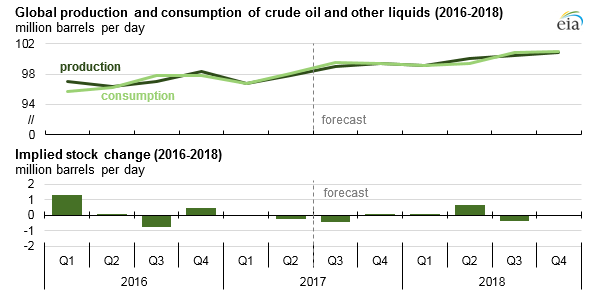
OIL PRICES TAKES TIME

IEA - The re-balancing of the oil market desired by the leading producers has been a stubborn process and it takes time for the numbers to confirm what many observers instinctively feel has already happened. Sure enough, new data suggests that in 2Q17 global stocks fell by 0.5 mb/d and preliminary data for July, particularly in the United States where stocks fell by 790 kb/d, is supportive. Even so, we must not forget that they are falling from a very great height in volume terms. At the end of 2Q17, OECD commercial stocks, which are the component of the global total for which we have the most visibility, stood at 3 021 million barrels, still more than 219 mb above the five-year average although they have now fallen below 2016 levels. As an exercise, if OECD stocks fell by 0.5 mb/d until the end of 1Q18 when the current output agreements expire they would still be about 60 mb above the five-year average.
There would be more confidence that re-balancing is here to stay if some producers party to the output agreements were not, just as they are gaining the upper hand, showing signs of weakening their resolve. The compliance rate with OPEC's output cut fell again in July to a new low of 75% from June's revised figure of 77%. For those non-OPEC countries acting in support, their compliance rate in July was 67%. Together, the twenty-two countries are producing about 470 kb/d in excess of their commitment. Some of them are clearly determined that the output agreements will succeed: Saudi Arabia has indicated that export levels in August will fall to 6.6 mb/d, and, according to recent reports, it will cut customer allocations in September. Other countries currently have very low compliance rates, although this can change. In passing, we must note that the current situation in Venezuela is being monitored closely with respect to any market impact should oil production and exports fall significantly.
Producers should find encouragement from demand, which is growing year-on-year more strongly than first thought. Our growth estimate for 2017 has been increased to 1.5 mb/d, including very strong data for 2Q17 when demand increased by 1.8 mb/d. We also expect relatively strong demand growth for 2018 of 1.4 mb/d. From the producers' viewpoint, strong growth reduces the stocks overhang when expressed in terms of days of forward demand cover: perhaps this is a more relevant measure than simple volume. However, there is a sting in the tail because recently notified changes to historical data suggest that demand in some developing countries was overstated. We have accordingly reduced our estimate of non-OECD demand for 2015 by 0.2 mb/d and for 2016 by 0.4 mb/d. The impact of carrying this lower demand base into 2017 against unchanged supply numbers is that stock draws later in the year are likely to be lower than first thought.
Even so, this does not dilute the importance of the message that the market is re-balancing. Brent crude oil prices have recently stabilised above $50/bbl following a period a few weeks ago when, as we said in last month's Report, there was "waning confidence" in the market. If re-balancing is to be maintained, the producers that are committed to seeing the task through to March 2018 need to convince the market that they are in it together. It is not entirely clear that this is the case today.
-----
Earlier:

OIL PRICES: $51 - $52
North Sea Brent crude oil spot prices averaged $48 per barrel (b) in July, $2/b higher than the June average and almost $4/b higher than in July 2016. EIA forecasts Brent spot prices to average $51/b in 2017 and $52/b in 2018. West Texas Intermediate (WTI) crude oil prices are forecast to average $2/b less than Brent prices in both 2017 and 2018.

OIL STOCKS DOWN BY 500 TBD
Global oil stocks fell by 500,000 b/d and preliminary data for July, particularly in the US where stocks fell by 790,000 b/d, is supportive of rebalancing supplies with demand, according to the most recent Oil Market Report from the International Energy Agency.
OPEC OIL PRODUCTION UP 173 TBD
Total crude oil production from the Organization of Petroleum Exporting Countries increased 173,000 b/d month-over-month in July to average 32.87 million b/d.
LIBYA'S OIL UP TO 1.069 MBD
Libya's oil production is 1.069 million b/d, and the country hopes to grow its output to as much as 1.25 million b/d this year, a source close to production said Monday.
РАВНОВЕСИЕ РЫНКА
Министерский комитет рассмотрел отчет Совместного технического комитета (СТК) и отметил, что рынок нефти уверенно делает шаги в сторону восстановления равновесия. По мнению экспертов, продолжается оздоровление мирового нефтяного рынка: за последние недели волатильность рынка снизилась, и поток инвестиций в нефтяную промышленность заметно увеличился.
ВЫСОКИЙ УРОВЕНЬ СОТРУДНИЧЕСТВА
В прямом эфире телеканала «Россия 24» Министр энергетики Российской Федерации Александр Новак подвел итоги 4-ого заседания Министерского комитета по мониторингу исполнения соглашения о сокращении добычи нефти стран ОПЕК и не-ОПЕК.
OIL OUTPUT CONSENSUS
With prices still languishing below the $55-$60/b that some ministers have said they are targeting, some market watchers say OPEC and its non-OPEC partners have no choice but to deepen cuts to make up for output gains from exempt Nigeria and Libya, as well as sliding compliance from other members.




